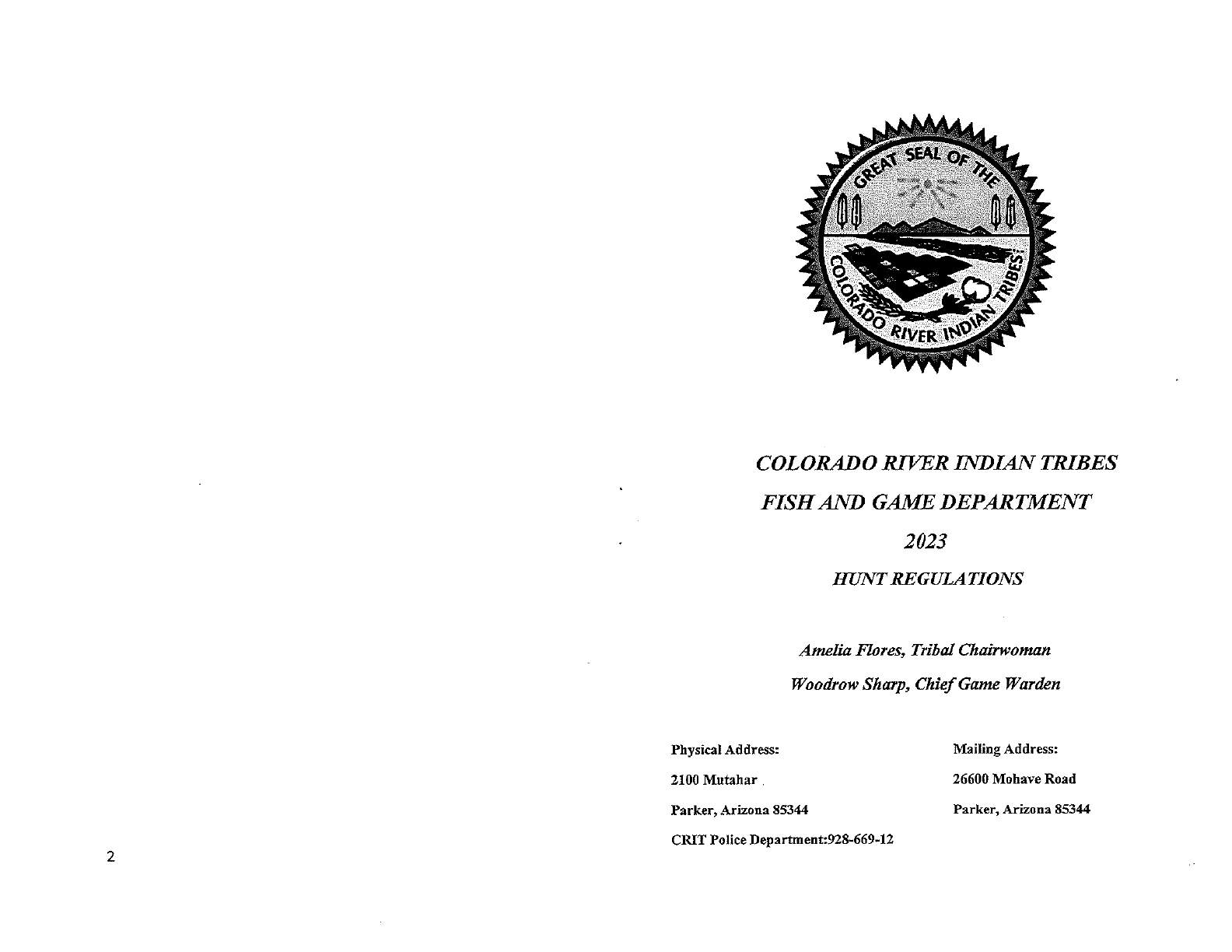
COLORADO RWER INDIAN TRIBES
FISH AND GAME DEPARTMENT
2023
HUNT REGULATIONS
Amelia Flores, Tribal Chairwoman
Woodrow Sharp, Chief Game Warden
Physical Address:
2100 Mutahar
Parker, Arizona 85344
CRIT Police Department:928-669-12
Mailing Address:
26600 Mohave Road
Parker, Arizona 85344
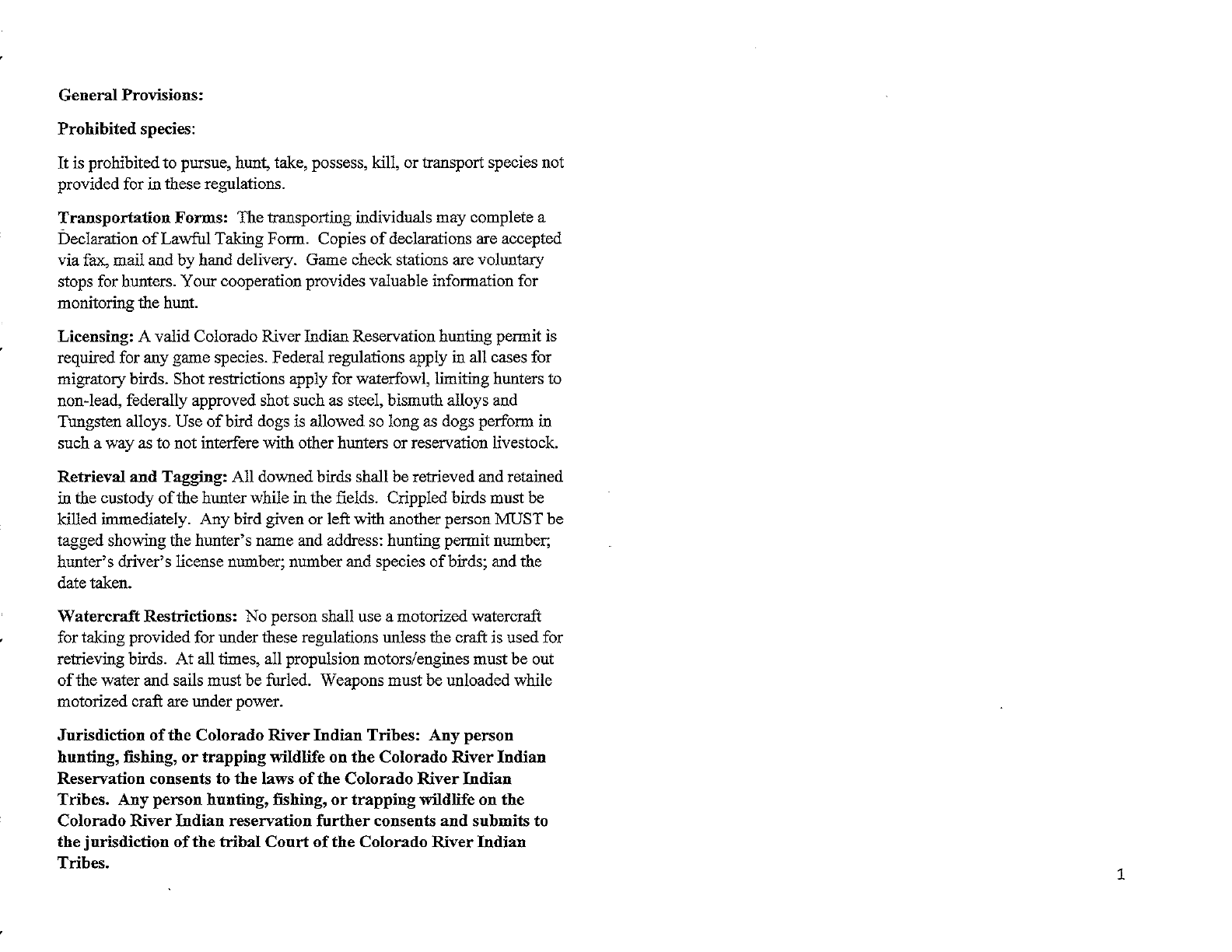
General Provisions:
Prohibited species:
It is prohibited to pursue, hunt, take, possess, kill, or transport species not
provided for in these regulations.
Transportation Forms: The transporting individuals may complete a
Declaration of Lawful Taking Form. Copies of declarations are accepted
via fax, mail and by hand delivery. Game check stations are voluntary
stops for hunters. Your cooperation provides valuable mformation for
monitoring the hunt.
Licensing: A valid Colorado River Indian Reservation hunting permit is
required for any game species. Federal regulations apply m all cases for
migratory birds. Shot restrictions apply for waterfbwl, limiting hunters to
non-lead, federally approved shot such as steel, bismuth alloys and
Tungsten alloys. Use of bird dogs is allowed so long as dogs perfonn in
such a way as to not interfere with other hunters or reservation livestock.
Retrieval and Tagging: All downed birds shall be retrieved and retained
in the custody of the hunter while in the fields. Crippled birds must be
killed immediately. Any bird given or left with another person MUST be
tagged showing the hunter's name and address: hunting permit number;
hunter's driver's license number; number and species of birds; and the
date taken.
Watercraft Restrictions: No person shall use a motorized watercraJft
for tajking provided for under these regulations unless the craft is used for
retrieving birds. At all times, all propulsion motors/engmes must be out
of the water and sails must be fttded. Weapons must be unloaded while
motorized craft are under power.
Jurisdiction of the Colorado River Indian Tribes: Any person
hunting, fishing, or trapping wildlife on the Colorado River Indian
Reservation consents to the laws of the Colorado River Indian
Tribes. Any person hunting, fishing, or trapping wildlife on the
Colorado River Indian reservation further consents and submits to
the j urisdiction of the tribal Court of the Colorado River Indian
Tribes.
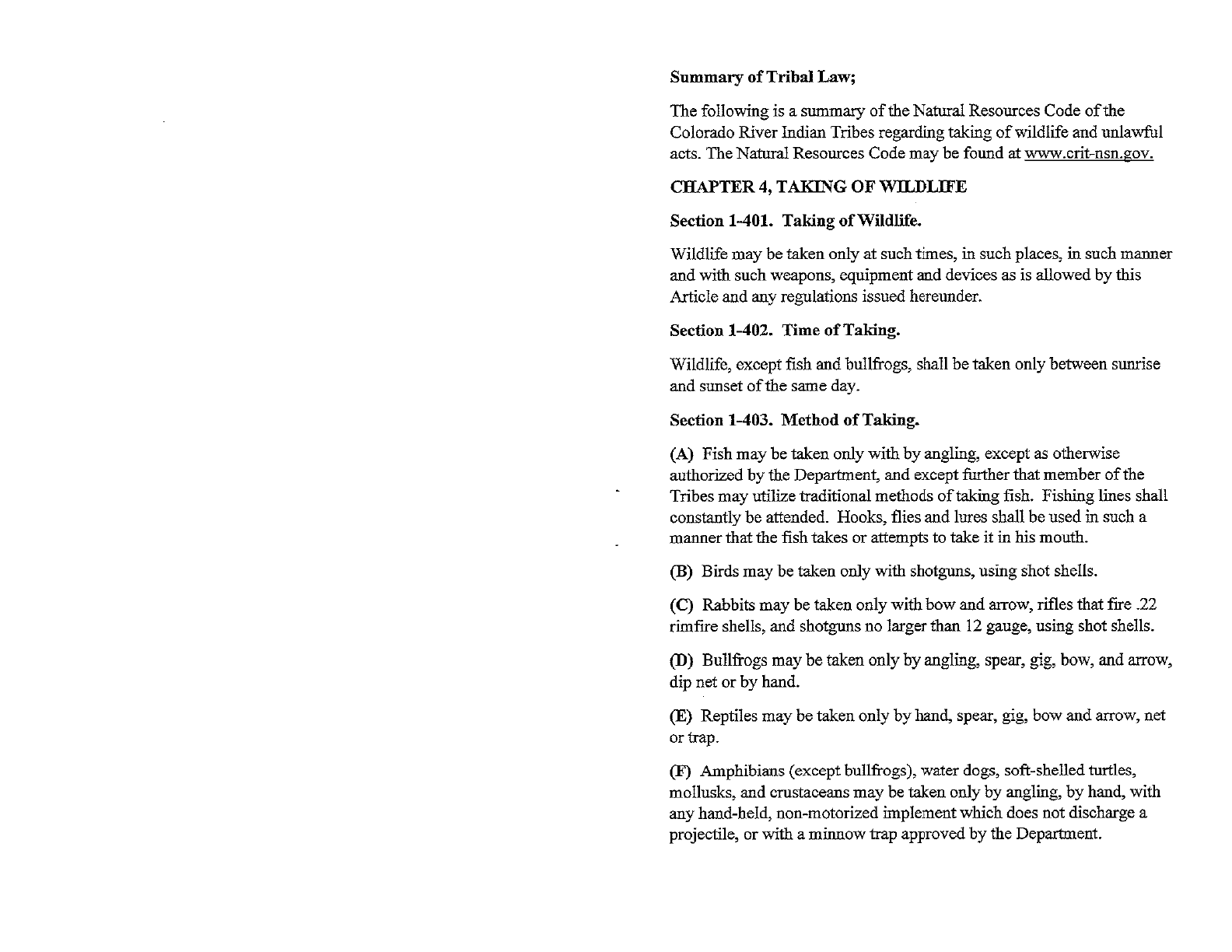
Summary of Tribal Law;
The following is a summary offhe Natural Resources Code of the
Colorado River Indian Tribes regarding taking of wildlife and unlawful
acts. The Natural Resources Code may be found at www.crit-nsn.gov.
CHAPTER 4, TAKING OF WILDLIFE
Section 1-401. Taking of Wildlife.
Wildlife may be taken only at such times, m such places, in such manner
and wifh such weapons, equipment and devices as is allowed by this
Article and any regulations issued hereunder.
Section 1-402. Time of Taking.
Wildlife, except fish and bullfrogs, shall be taken only between sunrise
and sunset offhe same day.
Section 1-403. Method of Taking.
(A) Fish may be taken only with by anglmg, except as otherwise
authorized by the Department, and except further that member of the
Tribes may utilize traditional methods of taking fish. Fishing lines shall
constantly be attended. Hooks, flies and lures shall be used in such a
manner that fhe fish takes or attempts to take it in his mouth.
(B) Birds may be taken only with shotguns, usmg shot shells.
(C) Rabbits may be taken only with bow and arrow, rifles that fire .22
rimfire shells, and shotguns no larger than 12 gauge, using shot shells.
(D) Bullfi-ogs may be taken only by angling, spear, gig, bow, and arrow,
dip net or by hand.
(E) Reptiles may be taken only by hand, spear, gig, bow and arrow, net
or trap.
(F) Amphibians (except bullfrogs), water dogs, sojft-shelled turtles,
moUusks, and crustaceans may be taken, only by anglmg, by hand, with
any hand-held, non-motorized implement whicli does not discharge a
projectile, or with a minnow trap approved by the Department.

CHAPTER 4, SECTION 1-404. FIREARMS; PROHIBFTIONS
The following weapons, ammunition, devices and materials may not be
used for the taking of wildlife, nor may tihey be possessed in the field
while hunting: Italic sections are most common violations.
(1) Fully automatic firearms, includmg firearms capable of selective
automatic fire.
(2) Tracer and armor piercing ammunition, full jacketed bullets other
than those designed for hunting.
(3) Semiautomatic, bolt action and lever action rifles with a magazine
capacity of more than five (5) center fire cartridges.
(4) Shotguns with a capacity of more than three (3) shells and
shotguns exceeding ten (10) gauge.
(5) Poisoned arrows or arrows with explosive tips.
(6) cross bows.
(7) Pitfalls, explosives, poisons or stupefying substances.
(8) Jack light or any other type of artificial light except when used for
the taking ofbullfrogs.
(9) Weapons banned by federal law.
(10) All muzzle loading rifles of a caliber exceedmg .58 and all center
fire rifles of a caliber exceeding .30.
(11) Hand guns may be used for the hunting of wildlife only upon
obtaining prior written permission of the Tribal Council. In no event
shall a hand gun used for the hunting of wildlife have a barrel shorter
than four (4) inches in length.
As Amended February 11, 1984, OrcL No. 84-3, Section 4
Camping Information
Camping permits are required on the Colorado River
Indian Tribes reservation.
Natural Resource Code Article 2-205
Camping Fees: $15.00 per day per family or up to three (3)
adult individuals m one vehicle, tent or RV.
Family constitutes a man and wife and their unmarried
children under fhe age of eighteen (18). Friends or relatives (not
immediate family) camping together in one vehicle, tent or RV one
permit is required for up to three (3) individuals, the fourth person
is required for up to three (3) individuals, the fourth person is
required to have a second permit.
Camping permits will require: Information from your
Driver's License: Vehicle Lice. Plate number. Number of people
and Number of days you will be camping.
It is illegal to occupy a camping site more than
fourteen (14) days.
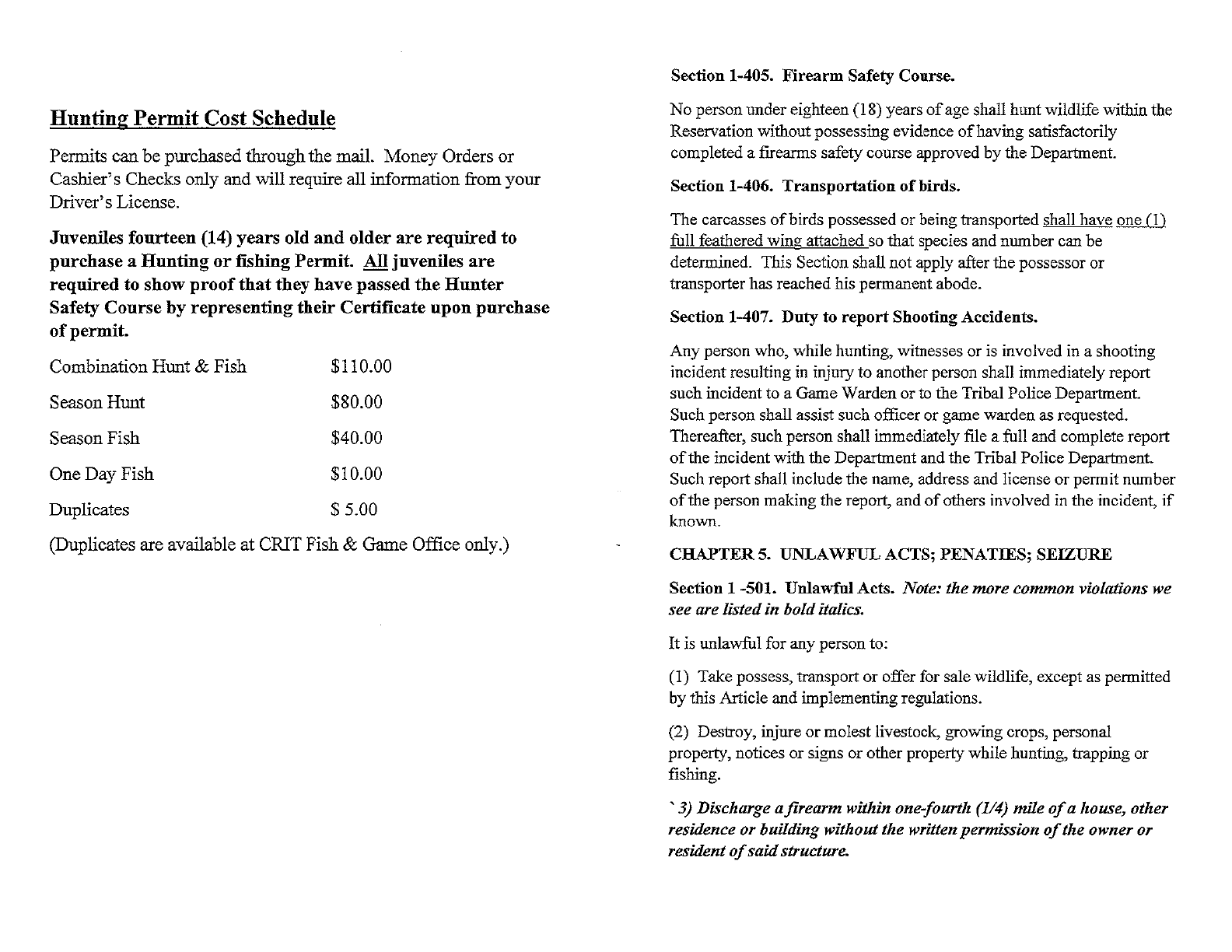
Hunting Permit Cost Schedule
Permits can be purchased through the mail. Money Orders or
Cashier's Checks only and will require all information from your
Driver's License.
Juveniles fourteen (14) years old and older are required to
purchase a Hunting or fishing Permit. All juveniles are
required to show proof that they have passed the Hunter
Safety Course by representing their Certificate upon purchase
of permit.
Combination Hunt & Fish
Season Hunt
Season Fish
One Day Fish
Duplicates
$110.00
$80.00
$40.00
$10.00
$5.00
(Duplicates are available at CRIT Fish & Game Office only.)
Section 1-405. Firearm Safety Course.
No person under eighteen (18) years of age shall hunt wildlife within the
Reservation without possessing evidence of having satisfactorily
completed a firearms safety course approved by the Department.
Section 1-406. Transportation of birds.
The carcasses of birds possessed or being transported shall have one fl)
full feathered wing attached so that species and number can be
determmed. This Section, shall not apply after the possessor or
transporter has reached his pennanent abode.
Section 1-407. Duty to report Shooting Accidents.
Any person who, while hunting, witnesses or is involved in a shooting
incident resulting in injury to another person shall immediately report
such mcident to a Game Warden or to the Tribal Police Department
Such person shall assist such officer or game warden as requested.
Thereafter, such person shall immediately file a full and complete report
of the incident with the Department and the Tribal Police Department.
Such report shall include the name, address and license or permit number
of the person making the report, and of others involved in the incident, if
known.
CHAPTER 5. UNLAWFUL ACTS; PENATDES; SEIZinRE
Section 1 "501. Unlawful Acts. Note: the more common violations we
see are listed in bold italics.
It is unlawful for any person to:
(1) Take possess, transport or offer for sale wildlife, except as permitted
by this Article and implementing regulations.
(2) Destroy, injure or molest livestock, growing crops, personal
property, notices or signs or other property while hunting, trapping or
fishing.
3) Discharge a firearm within one-fourth (1/4) mile of a house, other
residence or building without the written permission of the owner or
resident of said structure.

Section 1-50L Unlawful Acts: Penalties; Seizures. Continued
(4) Take wildlife and willfully permit the edible portions thereof to spoil
or otherwise go to waste.
(5) Take game other than birds with the aid of dogs.
(6) Obtain or attempt to obtain a license or permit after a license or
permit for the same purpose and for the period had been revoked.
(7) Litter a hunting or fishing area.
(8) Possess while hunting, any device designed to silence, muffle or
minimize the report of a firearm.
(9) Obtain by j&aud or misrepresentation of a license or permit.
(10) Discharge a firearm, or other device from a vehicle including, but
not limited to an automobile, aircraft^ train or boat^ except as expressly
authorised in writing by the Department, or discharge a firearm or
other device from, upon across or onto a roadway or any other right-
of-way maintained.
(11) Taking wildlife or handle or discharge any firearm with wanton
disregard for the safety of human life or property in a careless or
reckless manner or while intoxicated.
(12) hunt or take any wildlife other than during the prescribed season
or in excess of the prescribed bag limit
(13) hunt, trap or fish for wildlife or attempt to do so without a valid
license or permit.
(14) Fail or refuse to exhibit a license or permit on demand of any game
warden or other representative of the department. Or of any law
enforcement official of the Tribes or any other duly authorized official of
the Tribes or the United States.
(15) Fail to report a shooting incident as required by Section 1-407.
(16) Violate any other provision of this Article.
Mammals Continued:
The foregoing regulation was issued by the
Department of Fish and Game pursuant to
Article I, Section 1-205 of the Natural
Resources Code and was duly approved by
the Administrative Committee on the Day
of July 31st. 2023.
Administrative Committee
Colorado River Indian Tribes
Amelia Flores
Chairwoman, Tribal Council
Secretary, Tribal Council
Department of Fish and Game
Colorado River Indian Tribes
Woodrow Sharp
Chief Game Warden
^^^

Deer, Continued:
(C) Family means for the purpose of these regulations is
defined as a husband and wife or an unmarried man and
woman that are living together and includes their
dependent unmarried children under the age of 18 years
of age. A married child and his or her spouse and
children constitute a separate family.
(D) A tribal senior citizen (age 55 or older) may
designate, in writing, a CRIT Tribal Member to take a
deer for them. A designation is not transferable and the
C.RJ.T. Fish and Game must be notified when the deer
tag is issued.
(E) Tribal members are required to obtain their Deer
Permit and Declaration of Lawful Takmg Forms prior to
attempting to take any animal.
(F) Successful Tribal deer hunter shall munedlately
place the tag on the deer's leg or antler before removing
carcass from the location where the deer was harvested,
and fill out the Declaration of Lawful Taking Form and
return the fonn to the C.R.LT. Fish and Game office.
Nothing in these regulations shall be construed as
effecting the jurisdiction or power of the Tribes to
manage, control or regulate wildlife under CRTT
Law. Nothing in these regulations shall be construed
as affecting the Sovereign Immunity of the Tribes.
Ethical Hunting is Everyone's business
"Ethics is not only about what you should not do, but what you should
do. Offer to lend a hand to another hunter if they are retrieving downed
game, share mformation on hunting conditions and engage in helpful
conversation with beginners you happen to meet."
Hunting is a heritage we all share and together we can continue to share
it for generations to come."
Brian Waking, Game Branch Chief
Arizona Game and Fish Department
What are Ethics?
Ethics generally relate to fairness, respect and responsibility. Aldo
Leopold once said ethical behavior is doing the right thing when no one
else is watching even when doing the wrong thing is legal. They are the
personal unwritten rules that we value. When we talk about an ethical
hunter fheir behaviors an example of the sportsmanship they demonstrate
in the field.
Ethics with Non-hunters
Show respect for other users of the land and their property. They possess
the same rights as you do to use the lands; Be courteous to non-hunters
when transporting your game -from the field. Transport animals
discretely; Don't leave remams of field dressing in places where it is
easily visible. Respect other people that may be walking by; clean up to
the best of your ability before entering into a public place when returning
from a hunt if you cannot change cloths. Present a professional image;
Take tasteful photographs of your hunt; Invite someone new to come
hunting with you.
"ethics" is reprinted with permission from:
Arizona Game and Fish Department
2012-13 Arizona Hunting and Trapping Regulations
www.azgtfd.sov

.<, JL Jl1--JfV JLJUUl^ATJL <^Ji. r
AU hunters are responsible for cleaning up after fliemselves. Shell
casings (shotshell hulls) and associated debris constitute litter and
must be picked up and packed out. Littering while hmiting or
fishing are violations which may result in criminal and /or fines. It
only takes a few minutes at the end of the hunt to pick up which
keeps the area clean for other users, protects wildlife and will help
preserve Colorado River Indian Tribe's huatmg tradition for future
generations.
Section 1-501. Unlawful Acts; It is unlawful for any person to:
(7) Litter a hunting or fishing area.
To prevent hunting excess of prescribed limits, it is prohibited for
hunters to "group" their takings into a commumty chest or bag
without properly tagging each killed bird. Please refer to the below
tagging requirements. Hunting or taking ofwUdllfe in excess of the
prescribed lixmt may result in the imposition of criminal and/or
civil fines and/or civil damages, including but not limited to $25.00
per excess migratory game bird/waterfowl, and/or revocation of
hunting permit The Colorado river Indian Tribes Fish & Game
Department is advising each hunter to mamtam his or her own bag.
Tagging Requirements: Each killed bird must be tagged with a
waterproof material (permanent marker) if placed in a container. It
is permissible to use adhesive labels for the exterior or wired tags
if the bad is not placed m water. Each bird must be tagged with the
following information: the hunter's and address; hunting permit
number; hunter's Driver's License; number and species of birds;
and the date taken.
Remember to leave a full feathered wing attached! Viola t ions
will be issued violation notices.
Mammal Season, Taking, Possession: Continued:
Deer:
Notice: Deer hunting is open to Tribal Members only.
The bag limit is one deer per family per year. If a
deer is taken in any one of the hunts the bag limit is
fulfilled. Family member must decide who is going to
hardest their deer.
Rifle Season(s):
First season: 10-12-2023 to 11-03-2023. Full day hunt
Bag limit: 1 per family (see notice).
Archery Deer Season: 11-09-23 to 12-01-2023. Full
day hunt
Bag limit: 1 per family (see Notice)
Second Rifle Deer season: 12-14-2023 to 01-12-2024.
Full day hunt.
Bag limit: 1 per family (see notice)
Speci^Lconstderation^a^ for deer.
(A) Bucks (male spike or better) Mule Deer or White-
tailed Deer or their subspecies may be taken.
(B) No person except an enrolled Tribal member of the
Colorado River Indian Tribes may hunt deer on the
Colorado River Indian Reservation.
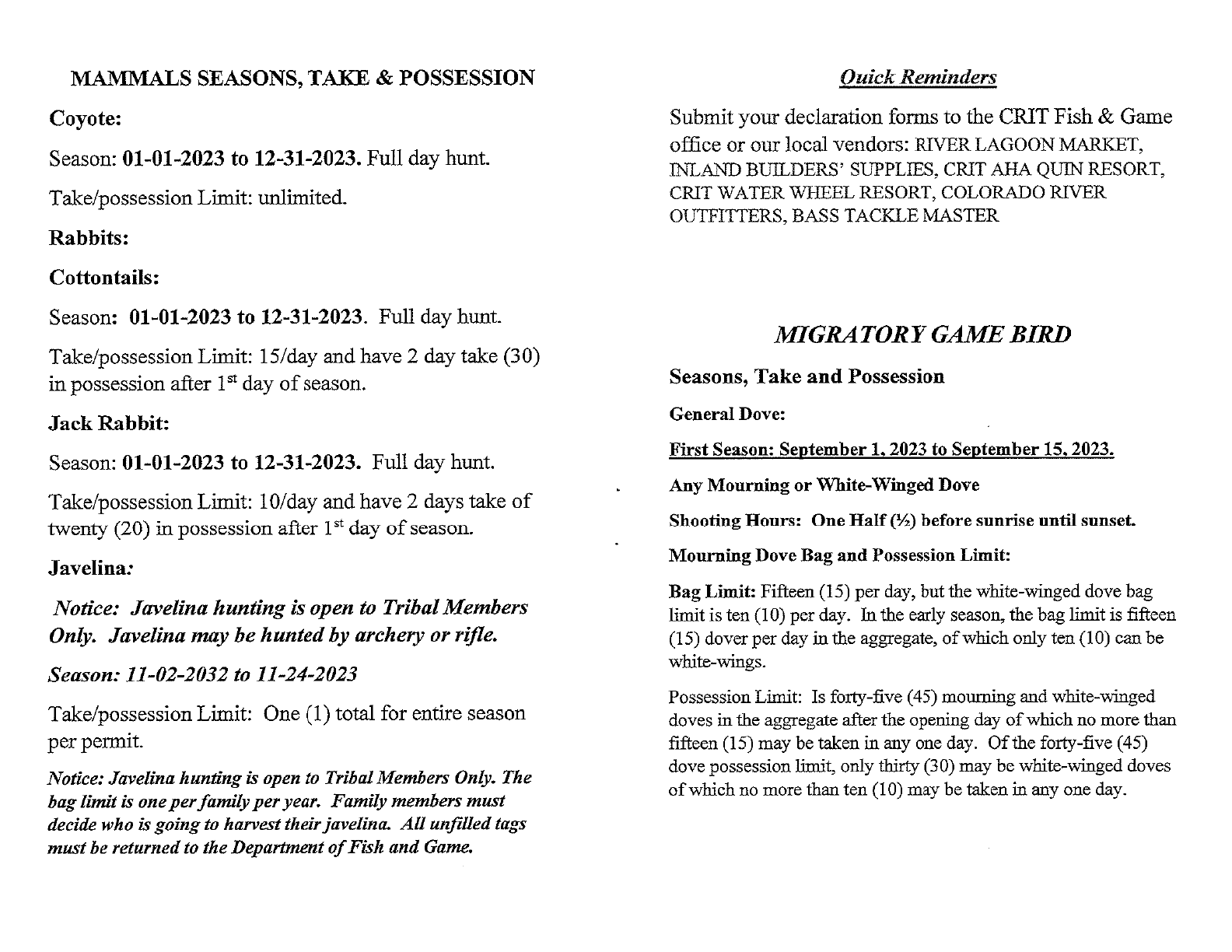
MAMMALS SEASONS, TAKE & POSSESSION
Coyote:
Season: 01-01-2023 to 12-31-2023. Full day hunt.
Take/possession Limit: unlimited.
Rabbits:
Cottontails:
Season: 01-01-2023 to 12-31-2023. Full day hunt.
Take/possession Limit: 15/day and have 2 day take (30)
in possession after 1st day of season.
Jack Rabbit:
Season: 01-01-2023 to 12-31-2023. Full day hunt.
Take/possession Limit: 10/day and have 2 days take of
twenty (20) in possession after 1st day of season.
Javelina:
Notice: Javelina hunting is open to Tribal Members
Only. Javelina may be hunted by archery or rifle.
Season: 11-02-2032 to 11-24-2023
Take/possession Limit: One (1) total for entire season
per permit.
Notice: Javelina hunting is open to Tribal Members Only. The
bag limit is one per family per year. Family members must
decide who is going to hardest their javelincL All unfilled tags
must be returned to the Department of Fish and Game.
Submit your declaration forms to the CRIT Fish & Game
office or our local vendors: RWER LAGOON MARKET,
INLAND BUILDERS' SUPPLIES, CRIT AHA QUEST RESORT,
GRIT WATER WHEEL RESORT, COLORADO RIVER
OUTFITTERS, BASS TACKLE MASTER
MIGRATORY GAME BIRD
Seasons, Take and Possession
General Dove:
Vvcst Season: September 1,2023 to September 15,2023.
Any Mourning or White-Winged Dove
Shootiag Hours: One Half (Vz) before sunrise until sunset.
Mourning Dove Bag and Possession Lunit:
Bag Limit: Fifteen (15) per day, but the white-winged dove bag
lixuit is ten (10) per day. In the early season, the bag limit is fifteen
(15) dover per day m the aggregate, of which only ten (10) can be
white-wings.
Possession Limit: Is forty-five (45) mourning and white-winged
doves in the aggregate after the opening day of which uo more than
fifteen (15) may be taken m any one day. Of the forty-five (45)
dove possession limit, only thirty (30) may be white-winged doves
of which no more than ten (10) may be taken m any one day.

Dove Continued:
Second Season: November 19,2023 to January 2, 2024.
Mourning Dove Only.
Shooting Hours: One half hour {Vz) before sunrise until sunset.
Bag Limit: fifteen (15) mourning Dove per day.
Possession Limit: Forty-five (45) mourning dove after opening
day, of which no more than fifteen (15) may be taken m any one
day.
Nothing in these regulations shall be construed as
effecting the jurisdiction or power of the Tribes to
manage, control or regulate wildlife under GRIT law.
Nothing in these regulations shall be construed as
affecting the Sovereign Immunity of the Tribes.
The foregoing regulation was issued by the
Department of Fish and Game pursuant to Article
I, Section 1-205 of the natural Resources Code
and was duly approved by the Administrative
Committee on the day of July 31st^ 2023
Administrative Committee Department of Fish and Game
Colorado Kiver Indian Tribes Colorado River Indian Tribes
Amelia FIores Woodrow Sharp
Chairwoman, Tribal Council
Chief Game Warden
PROTECTED NON-GAME SPECIES
Note: These species are protected by Federal and Tribal
law and may not be harassed in any way. (Includes any
Owl, Hawk, Falcon, Vulture;, Osprey, Eagle aad/or Rail
species)
Season: None
Take/Possession Limit: No take or possession allowed.
Non-Game Nuisance Birds:
Note: Non-Game Nuisance Birds requires a Special scare
permit available at the Fish and Game Department office
only. Includes: House Sparrows, Starlmgs, Blackbirds,
Brown-headed Cowbirds and Crows. A scare permit
only grants thepernutted to scare the above listed birds,
it does not permit the taking of the birds. The listed
birds may be protected by the Migratory Bird Treaty
Act
Trapping: For depredation only. Must apply at the fish
and Game Office for special trapping permit. Trapping
permits are issued solely at the discretion of the Fish and
Game Department.
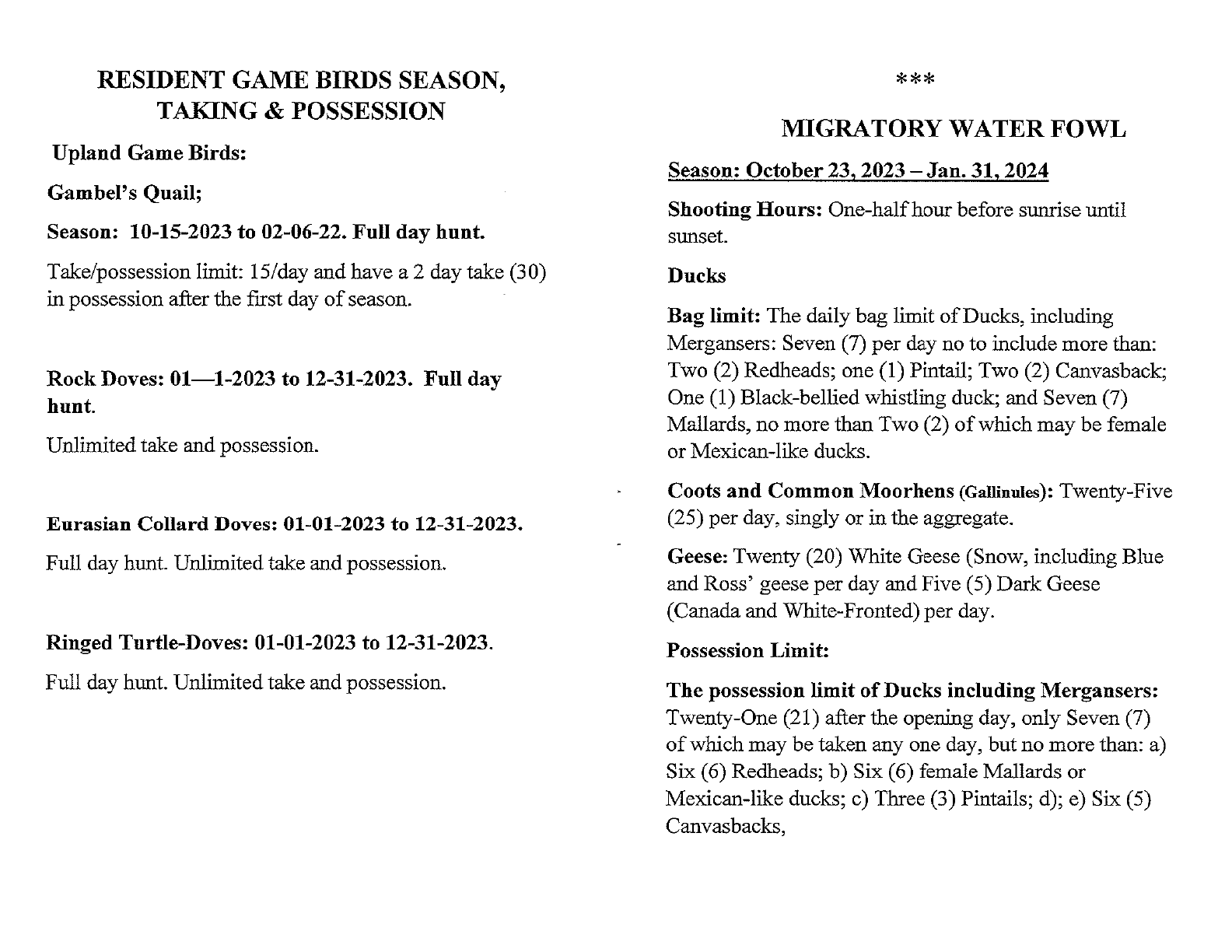
RESffiENT GAME BIRDS SEASON,
TAKING & POSSESSION
Upland Game Birds:
GambePs Quail;
Season: 10-15-2023 to 02-06-22. Full day hunt
Take/possession limit: 15/day and have a 2 day take (30)
in possession after the first day of season.
Rock Doves: 01—1-2023 to 12-31-2023. Full day
hunt.
Unlimited take and possession.
Eurasian Collard Doves: 01-01-2023 to 12-31-2023.
Full day hunt. Unlimited talce and possession.
Ringed Turtle-Doves: 01-01-2023 to 12-31-2023.
Full day hunt. Unlimited take and possession.
MIGRATORY WATER FOWL
Season: October 23,2023 - Jan. 31,2024
Shooting Hours: One-halfhour before sunrise until
sunset.
Ducks
Bag limit: The daily bag limit of Ducks, including
Mergansers: Seven (7) per day no to include more than:
Two (2) Redheads; one (1) Pintail; Two (2) Canvasback;
One (1) Black-bellied wMstling duck; and Seven (7)
Mallards, no more than Two (2) of which may be female
or Mexicaa-llke ducks.
Coots and Common Moorhens (GaUinules): Twenty-Five
(25) per day, singly or m the aggregate.
Geese: Twenty (20) White Geese (Snow, including Blue
and Ross' geese per day and Five (5) Dark Geese
(Canada and White-Fronted) per day.
Possession Limit:
The possession limit of Ducks including Mergansers:
Twenty-One (21) after the openmg day, only Seven (7)
of which may be taken any one day, but no more than: a)
Sue (6) Redheads; b) Six (6) female Mallards or
Mexican-like ducks; c) Three (3) Pintails; d); e) Sbc (5)
Canvasbacks,
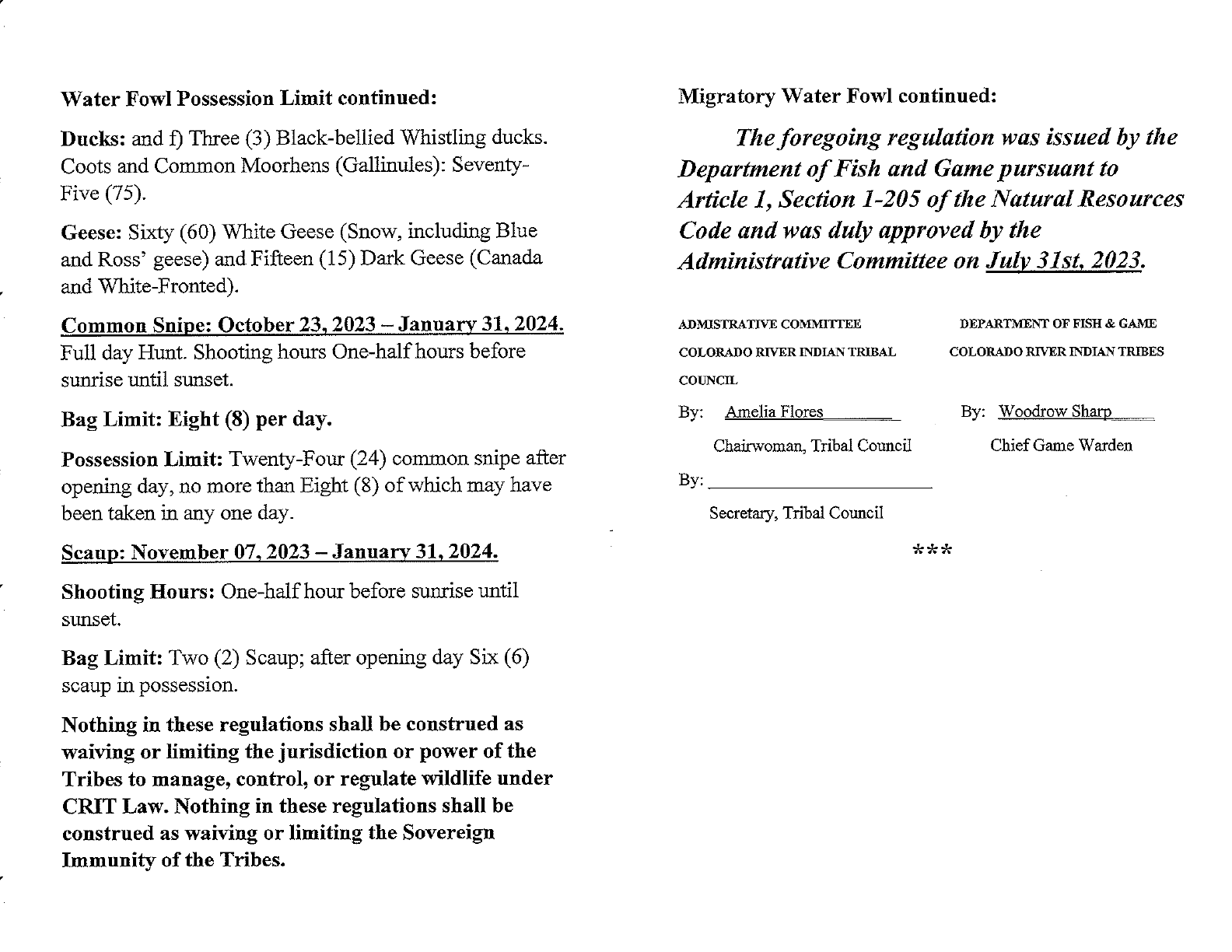
Water Fowl Possession Limit continued:
Ducks: and f) Three (3) Black-bellied Whistling ducks.
Coots and Common Moorhens (Gallinules): Seventy-
Five (75).
Geese: Sixty (60) White Geese (Snow, including Blue
and Ross' geese) and Fifteen (15) Dark Geese (Canada
and White-Fronted).
Common Snipe: October 23,2023 - January 31,2024.
Full day Hunt. Shooting hours One-half hours before
sunrise until sunset.
Bag Limit: Eight (8) per day.
Possession Limit: Twenty-Four (24) common snipe after
opening day, no more than Eight (8) of which may have
been taken in any one day.
Scaup: November 07, 2023 - January 31,2024.
Shooting Hours: One-halfhour before sunrise until
sunset.
Bag Limit: Two (2) Scaup; after opening day Sbc (6)
scaup m possession.
Nothing in these regulations shall be construed as
waiving or limiting the jurisdiction or power of the
Tribes to manage, control, or regulate wildlife under
CRIT Law. Nothing in these regulations shall be
construed as waiving or limiting the Sovereign
Immunity of the Tribes.
Migratory Water Fowl continued:
The foregoing regulation ^as issued by the
Department of Fish and Game pursuant to
Article 1, Section 1-205 of the Natural Resources
Code and was duty approved by the
Administrative Committee on July 31st, 2023.
ADMISTRATFVE COMMITTEE DEPARTMENT OF FISH & GAME
COLORADO RIVER INDIAN TRIBAL COLORADO RIVER INDIAN TRffiES
COUNCTL
By: Amelia FIores Bv: Woodrow Sharp^
Chairwoman, Tribal Council Chief Game Warden
By:.
Secretary, Tribal Council
'A'A^r
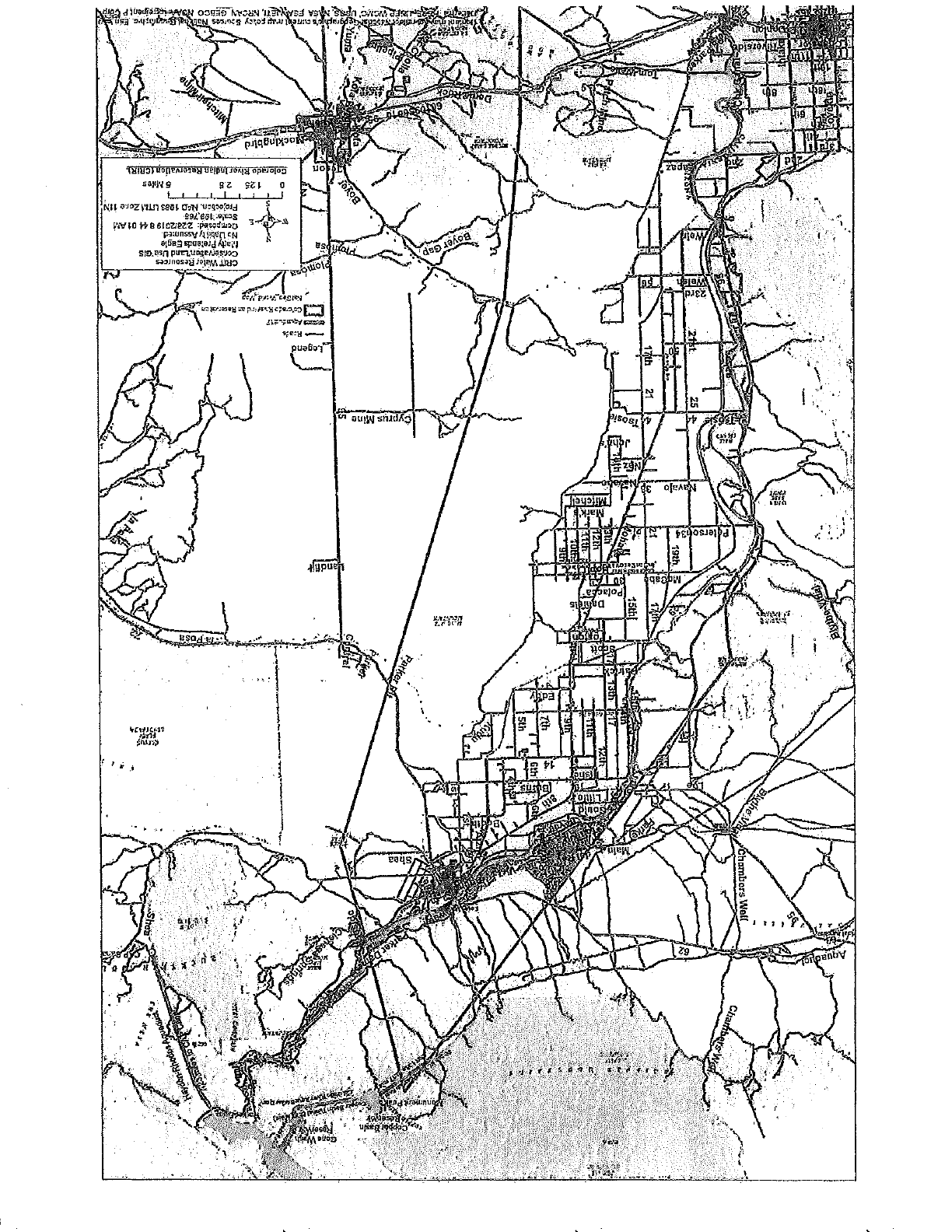
^diua^^g^y osggo
UN 3.UICJ
'[a!S3)Tn'[lEM9^aauEjpu|JtjiijH-opfJofo;j
un y-to'z.yiiTtfast fj-ns •usa^oid
-B^°(-L-^S I^-^A
iw to tfr a efosea-z ^Mduiso ^"•<
CM
FMinssv/USencM I.
o;5B3 EpuBiay Apft'j i*
Si3>.?SD pUET,1iB3CAtg,EU&3
Majnosay^lc/AJUas
y\s —"'y—^' —~^T—~~yrv^
.»H6
«' .\ yKite^~;i ..
